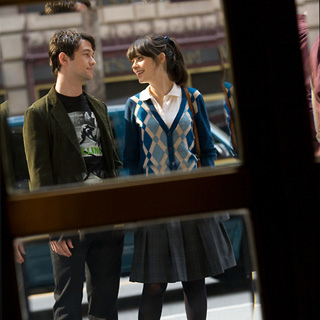In which love is love is love
"500 Days of Summer" is easily best-film-of-the-year material: quality acting, a conventional story told unconventionally (it starts on day 488; The End, as far as the wishful audience is concerned, jumps back and forth between blissful glow and melancholic forlornness like time is a joke), gimmicky Euro-art-house sequences, a timeless backdrop and a soundtrack that is more than just easy-listening noise. First-time director Marc Webb makes Los Angeles look like New York, which, in itself, is a visual novelty. It is one of the most original romances on the silver screen these days, but also the most unoriginal because it resembles reality.
But the most remarkable thing about "500 Days" is its ability to make reality look like fiction, and in turn, make reality a much harder thing to swallow. We are warned —by the trailer, by the blue undertone —that this is not a love story. This is a story in which boy meets girl, boy loses girl, boy tries to figure out why Hollywood’s (boy’s first formed his mind about romance based on "The Graduate") equation of Soul Mate + Soul Mate = True Love is flawed, boy meets another girl. Life goes on. Just because it is on the silver screen doesn’t mean that it doesn’t.
Summer Finn (Zooey Deschanel) dresses well, she has impeccable music taste (The Smiths, Nancy Sinatra), she has an apartment that could be an Anthropologie showroom. She is also one-dimensional and an evil, ungrateful witch. Who honestly thinks a shower sex partner is "just a friend"? Her motives are never satisfactorily explained and could only be attributed to a general cynicism towards love of this generation and, at best, quirkiness. Her lovability is entirely assumed—the only side we see of her is what Tom sees of her, as the entire story unfolds from his point of view. We love her because Tom Hanson (Joseph Gordon-Levitt) loves her, and we love Tom. The film only works if the audience feels for Tom.
We do feel for Tom. He dresses well, he has impeccable music taste, he has a chalkboard covering up a wall in his room, he could be a great architect but is instead writing "Roses are red, violets are blue…" for a greeting card company. He is the impossible gentleman who always holds the door out and walks on the curb side of the road. Girls can’t decide whether he would make a better boyfriend or best friend.

But Summer decides, in all her sweetness and honesty, which is so brutally honest that Tom has a hard time believing it. The complexity evolves, without contrived confrontations and awkward discoveries about each other’s "feelings" (what two people are supposed to have towards each other because they are the leading man and lady of the film). At the end of the day, the closest thing that Tom resembles in his relationship with Summer is three ugly words: friends with benefits. Although, the film does a beautiful job in a)disguising that or b)making that look like a beautiful thing.
Secretly, we all (even Tom) hope that a miraculous twist in the end would convince Summer of the One True Love just like we are of it because the Indie Poster Couple just look so darn right together. There is even a musical number with a cartoon singing bird that mocks just that. But appearance can be deceptive. Tom spends 500 days figuring that out. (So is he actually the one whose view is screwed up?)
A comedic "500 Days" would have made a sweet favorite flick. The real "500 Days" still possess the same sweet elements but it observes much more. We know up front that this is merely a story about love. Summer 1, Hollywood 0. Thank God real people still exist in movies.





